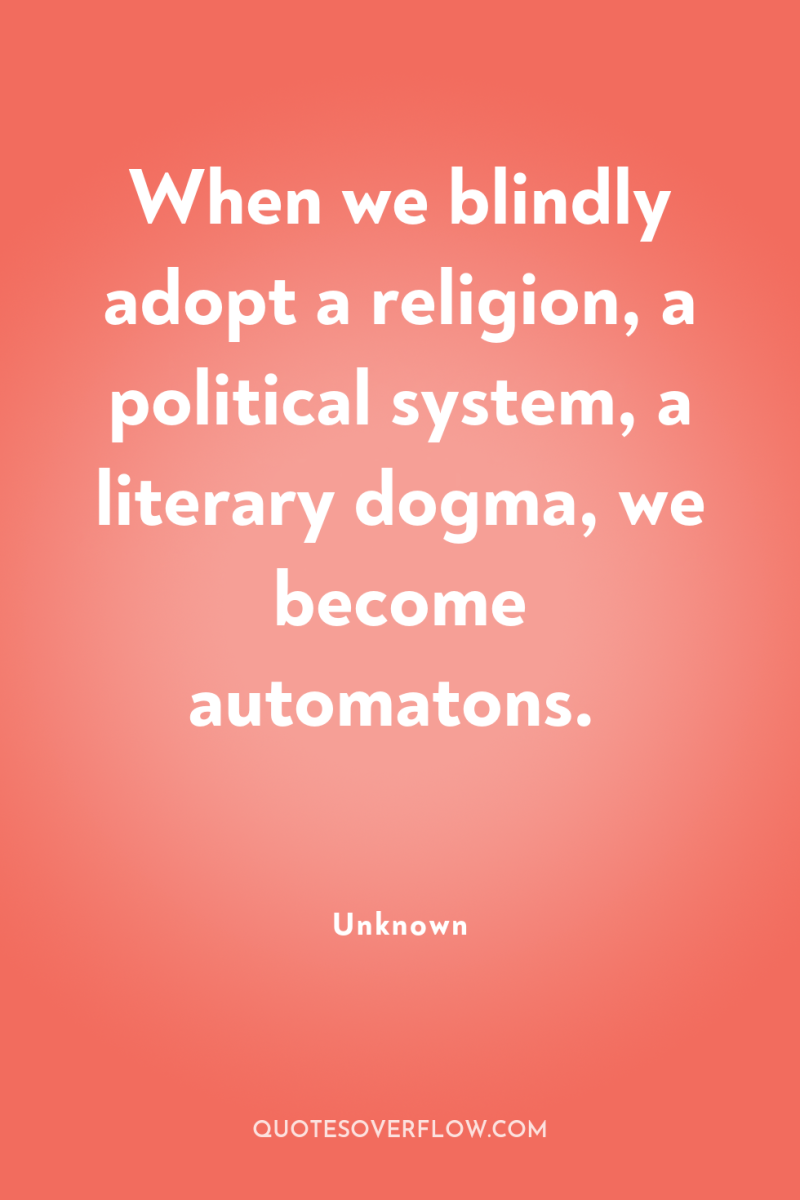
1
When we blindly adopt a religion, a political system, a literary dogma, we become automatons.Unknown
2
Oh, if only it were possible to find understanding, ” Joseph exclaimed. “If only there were a dogma to believe in. Everything is contradictory, everything tangential; there are no certainties anywhere. Everything can be interpreted one way and then again interpreted in the opposite sense. The whole of world history can be explained as development and progress and can also be seen as nothing but decadence and meaninglessness. Isn’t there any truth? Is there no real and valid doctrine?” The master had never heard him speak so fervently. He walked on in silence for a little, then said: “There is truth, my boy. But the doctrine you desire, absolute, perfect dogma that alone provides wisdom, does not exist. Nor should you long for a perfect doctrine, my friend. Rather, you should long for the perfection of yourself. The deity is within you, not in ideas and books. Truth is lived, not taught. Be prepared for conflicts, Joseph Knecht - I can see that they already have begun. .Hermann Hesse
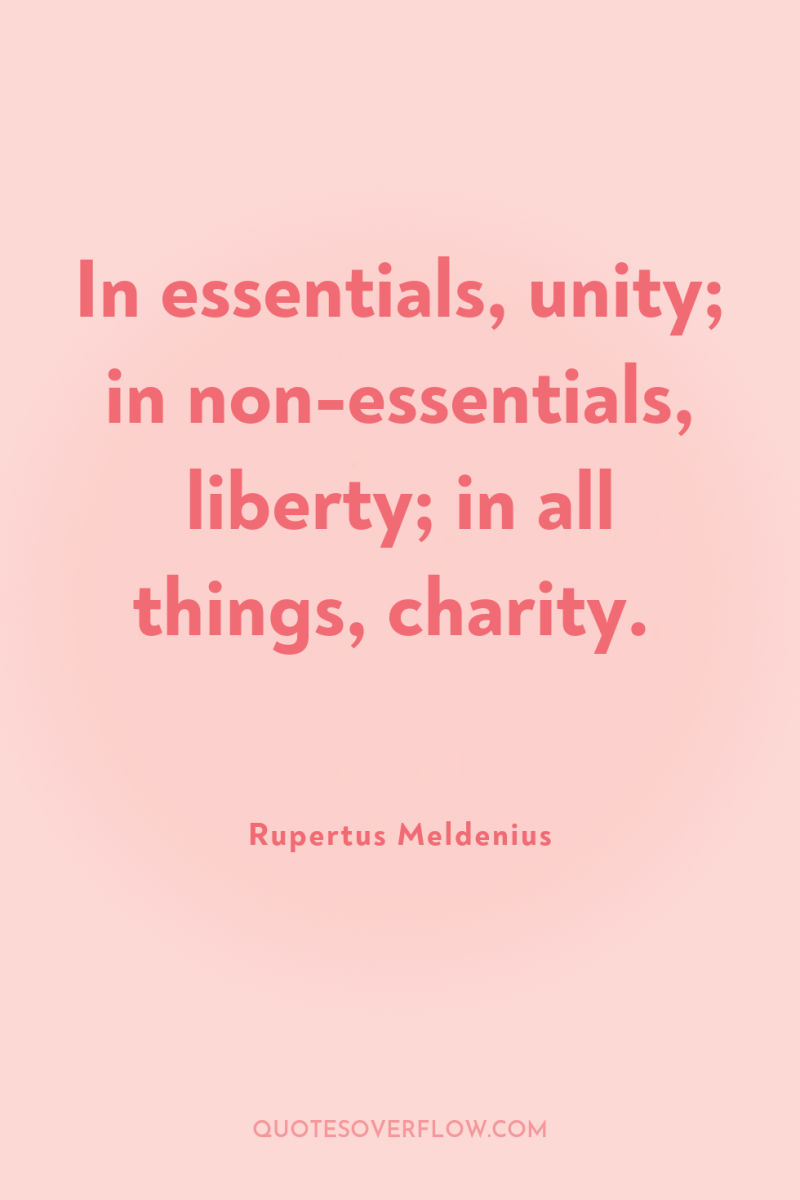
3
In essentials, unity; in non-essentials, liberty; in all things, charity.Rupertus Meldenius
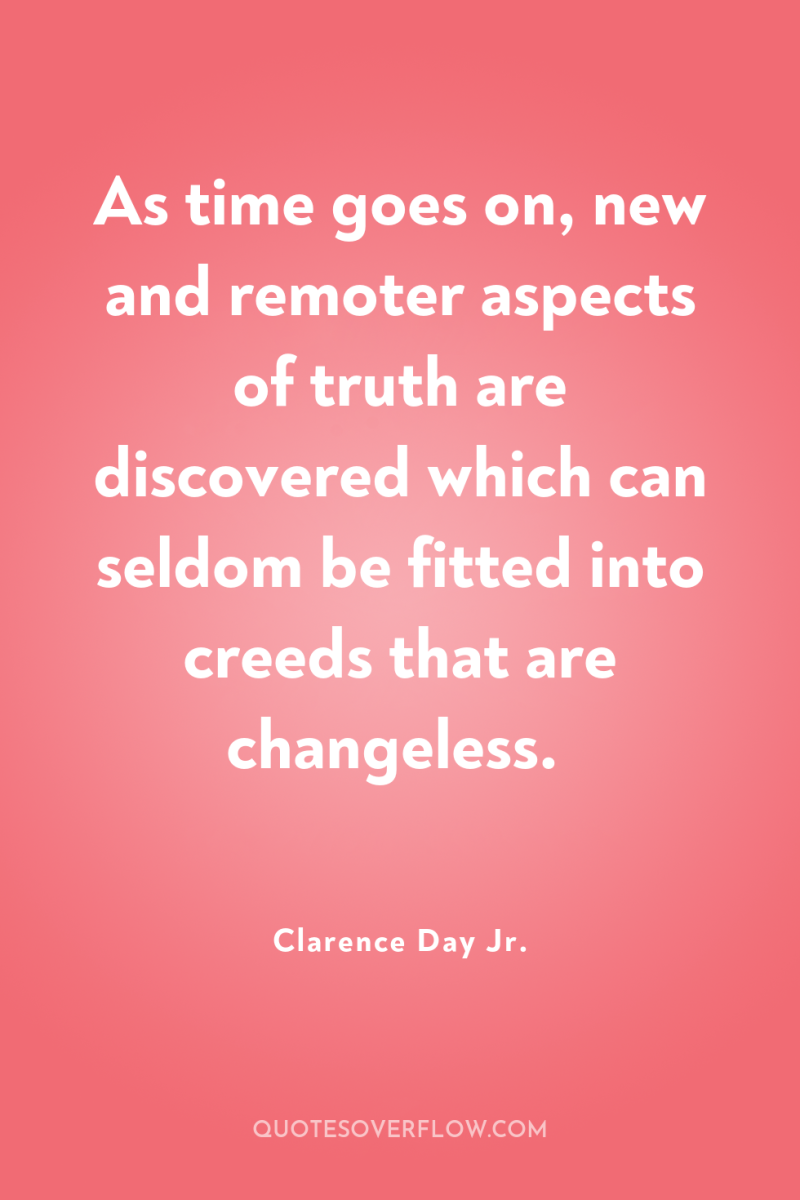
4
As time goes on, new and remoter aspects of truth are discovered which can seldom be fitted into creeds that are changeless.Clarence Day Jr.
5
Сè проÑ‚ивречи едно на друго, Ñè проÑ‚рчува едно крај друго, никаде нема ÑигурноÑÑ‚. Сè може да Ñе Ñ‚олкува вака, и Ñè може да Ñе Ñ‚олкува обраÑ‚но. СеÑ‚а човечка иÑÑ‚орија може да Ñе проÑ‚олкува како развој и напредок, а иÑÑ‚овремено без да Ñе види нешÑ‚о повеќе од пропаÑÑ‚ и глупоÑÑ‚. Зар нема виÑÑ‚ина? Зар не поÑÑ‚ои виÑÑ‚инÑка и валидна наука?.Hermann Hesse
6
Some people live in cages with bars built from their own fears and doubts. Some people live in cages with bars built from other people's fears and doubts; their parents, their friends, their brothers and sisters, their families. Some people live in cages with bars built from the choices others made for them, the circumstances other people imposed upon them. And some people break free.C. Joybell C.
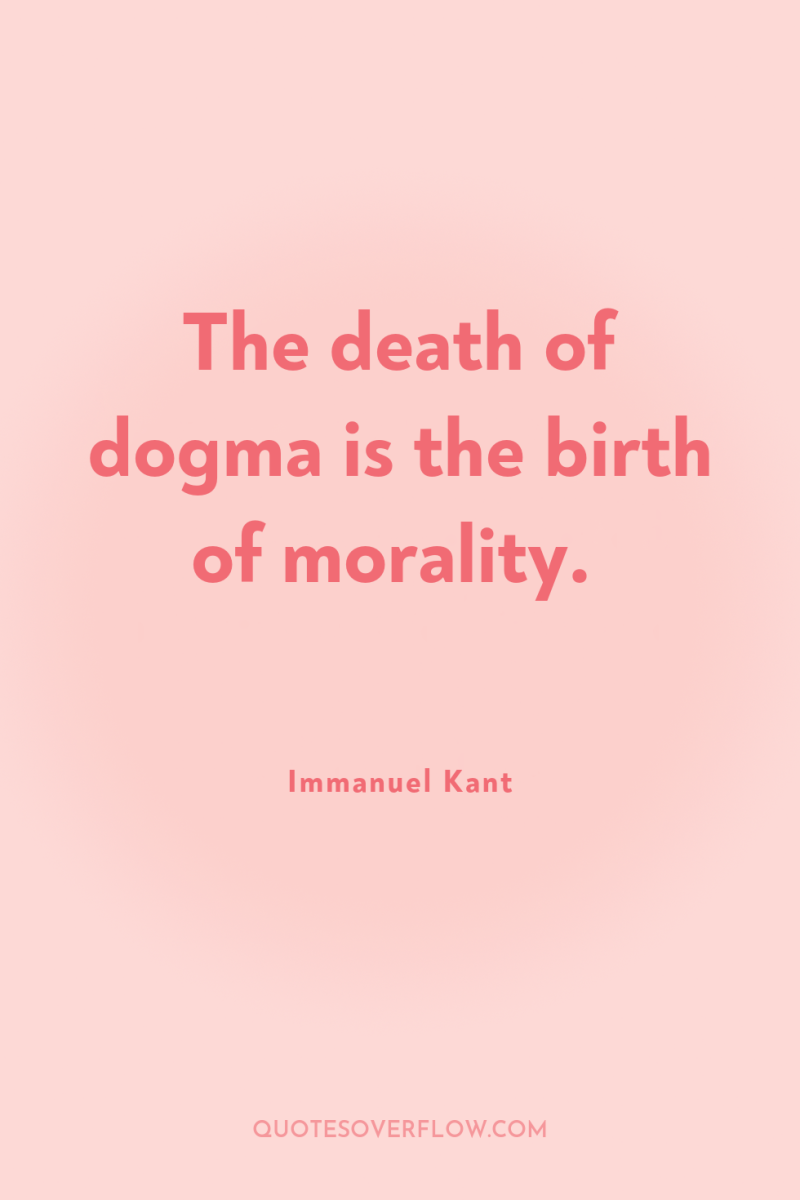
7
The death of dogma is the birth of morality.Immanuel Kant

8
To 'choose' dogma and faith over doubt and experience is to throw out the ripening vintage and to reach greedily for the Kool-Aid.Christopher Hitchens
9
Too much faith is the worst ally. When you believe in something literally, through your faith you'll turn it into something absurd. One who is a genuine adherent, if you like, of some political outlook, never takes its sophistries seriously, but only its practical aims, which are concealed beneath these sophistries. Political rhetoric and sophistries do not exist, after all, in order that they be believed; rather, they have to serve as a common and agreed upon alibi. Foolish people who take them in earnest sooner or later discover inconsistencies in them, begin to protest, and finish finally and infamously as heretics and apostates. No, too much faith never brings anything good..Milan Kundera
10
While believing strongly, without evidence, is considered a mark of madness or stupidity in any other area of our lives, faith in God still holds immense prestige in our society. Religion is the one area of our discourse where it is considered noble to pretend to be certain about things no human being could possibly be certain about. It is telling that this aura of nobility extends only to those faiths that still have many subscribers. Anyone caught worshipping Poseidon, even at sea, will be thought insane. .Sam Harris
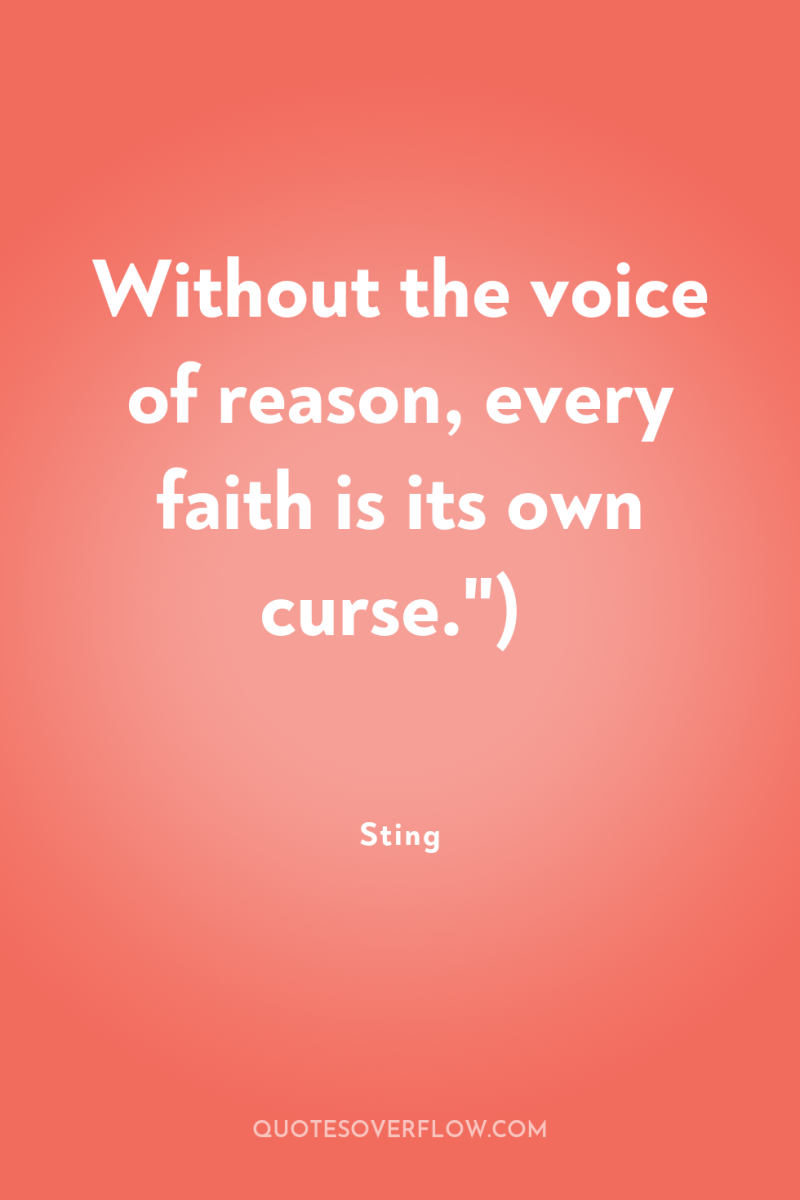
11
Without the voice of reason, every faith is its own curse.")Sting
12
Christianity is not a doctrine, I mean, a theory about what has happened and will happen to the human soul, but a description of something that actually takes place in human life. For 'consciousness of sin' is a real event an so are despair and salvation through faith. Those who speak of such things (Bunyan for instance) are simply describing what has happened to them, whatever gloss anyone may want to put on it.Ludwig Wittgenstein
13
Most reject the more repugnant or indefensible dogmas while still holding onto some core belief. Many believers will proudly describe themselves as "reasonable" or "rational" based on how little of their religion they still embrace versus how much they now reject. I think it's funny when people realize that the less you believe the more reasonable you are, but they stop before they reach the logical conclusion.Aron Ra
14
[Robert's eulogy at his brother, Ebon C. Ingersoll's grave. Even the great orator Robert Ingersoll was choked up with tears at the memory of his beloved brother] The record of a generous life runs like a vine around the memory of our dead, and every sweet, unselfish act is now a perfumed flower. Dear Friends: I am going to do that which the dead oft promised he would do for me. The loved and loving brother, husband, father, friend, died where manhood's morning almost touches noon, and while the shadows still were falling toward the west. He had not passed on life's highway the stone that marks the highest point; but, being weary for a moment, he lay down by the wayside, and, using his burden for a pillow, fell into that dreamless sleep that kisses down his eyelids still. While yet in love with life and raptured with the world, he passed to silence and pathetic dust. Yet, after all, it may be best, just in the happiest, sunniest hour of all the voyage, while eager winds are kissing every sail, to dash against the unseen rock, and in an instant hear the billows roar above a sunken ship. For whether in mid sea or 'mong the breakers of the farther shore, a wreck at last must mark the end of each and all. And every life, no matter if its every hour is rich with love and every moment jeweled with a joy, will, at its close, become a tragedy as sad and deep and dark as can be woven of the warp and woof of mystery and death. This brave and tender man in every storm of life was oak and rock; but in the sunshine he was vine and flower. He was the friend of all heroic souls. He climbed the heights, and left all superstitions far below, while on his forehead fell the golden dawning, of the grander day. He loved the beautiful, and was with color, form, and music touched to tears. He sided with the weak, the poor, and wronged, and lovingly gave alms. With loyal heart and with the purest hands he faithfully discharged all public trusts. He was a worshipper of liberty, a friend of the oppressed. A thousand times I have heard him quote these words: 'For Justice all place a temple, and all season, summer! ' He believed that happiness was the only good, reason the only torch, justice the only worship, humanity the only religion, and love the only priest. He added to the sum of human joy; and were every one to whom he did some loving service to bring a blossom to his grave, he would sleep to-night beneath a wilderness of flowers. Life is a narrow vale between the cold and barren peaks of two eternities. We strive in vain to look beyond the heights. We cry aloud, and the only answer is the echo of our wailing cry. From the voiceless lips of the unreplying dead there comes no word; but in the night of death hope sees a star and listening love can hear the rustle of a wing. He who sleeps here, when dying, mistaking the approach of death for the return of health, whispered with his latest breath, 'I am better now.' Let us believe, in spite of doubts and dogmas, of fears and tears, that these dear words are true of all the countless dead. And now, to you, who have been chosen, from among the many men he loved, to do the last sad office for the dead, we give his sacred dust. Speech cannot contain our love. There was, there is, no gentler, stronger, manlier man.Robert G. Ingersoll
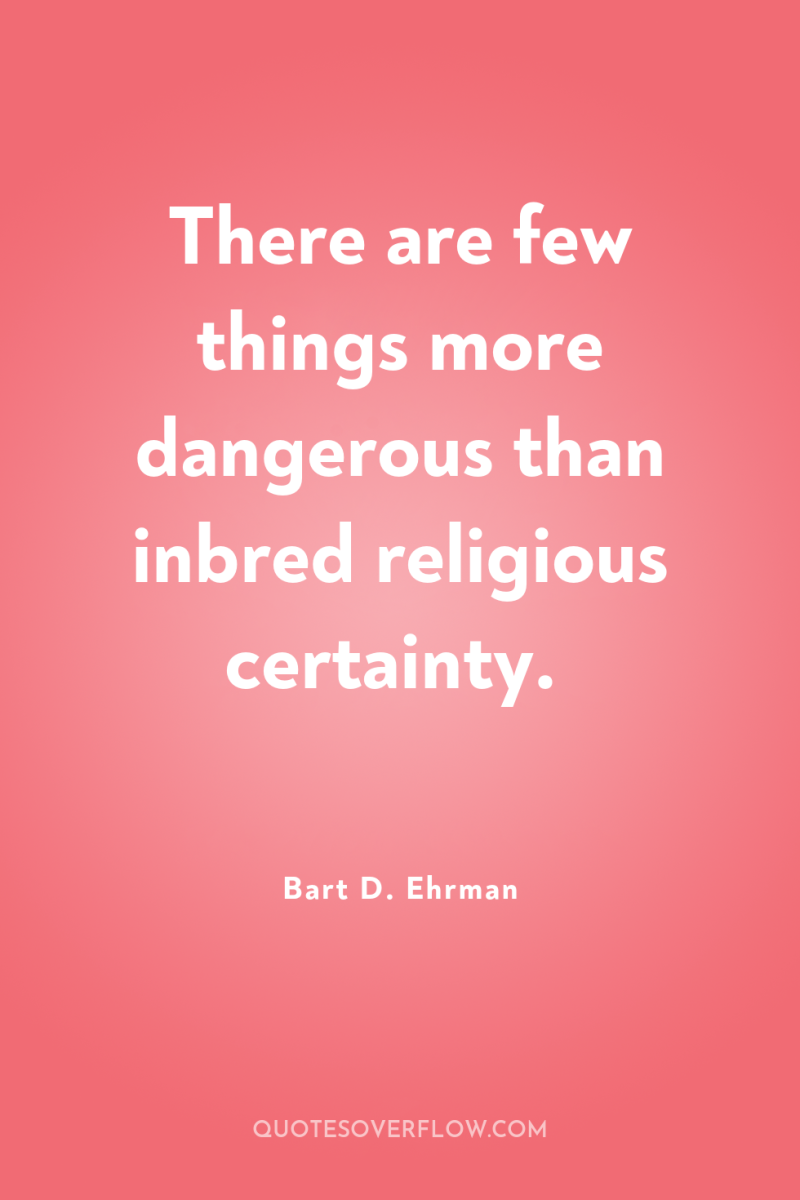
15
There are few things more dangerous than inbred religious certainty.Bart D. Ehrman
16
Science is opposed to theological dogmas because science is founded on fact. To me, the universe is simply a great machine which never came into being and never will end. The human being is no exception to the natural order. Man, like the universe, is a machine. Nothing enters our minds or determines our actions which is not directly or indirectly a response to stimuli beating upon our sense organs from without. Owing to the similarity of our construction and the sameness of our environment, we respond in like manner to similar stimuli, and from the concordance of our reactions, understanding is born. In the course of ages, mechanisms of infinite complexity are developed, but what we call 'soul' or 'spirit, ' is nothing more than the sum of the functionings of the body. When this functioning ceases, the 'soul' or the 'spirit' ceases likewise. I expressed these ideas long before the behaviorists, led by Pavlov in Russia and by Watson in the United States, proclaimed their new psychology. This apparently mechanistic conception is not antagonistic to an ethical conception of life. .Nikola Tesla
17
[We need reforms] to make the Negro church a place where colored men and women of education and energy can work for the best things regardless of their belief or disbelief in unimportant dogmas and ancient and outworn creeds.W.E.B. Du Bois
18
We are all tricked. We think that religion tells us what to believe; but it doesn't, it is telling us what not to believe. Atheism is not the absence of religion; atheism is the most undiluted form of religion: it tells us not to believe in anything at all. Atheists hate the religious and the religious hate atheists, but this is only a deception! We are all deceived! There is only one boat and we are all in it! All at the same time!.C. Joybell C.
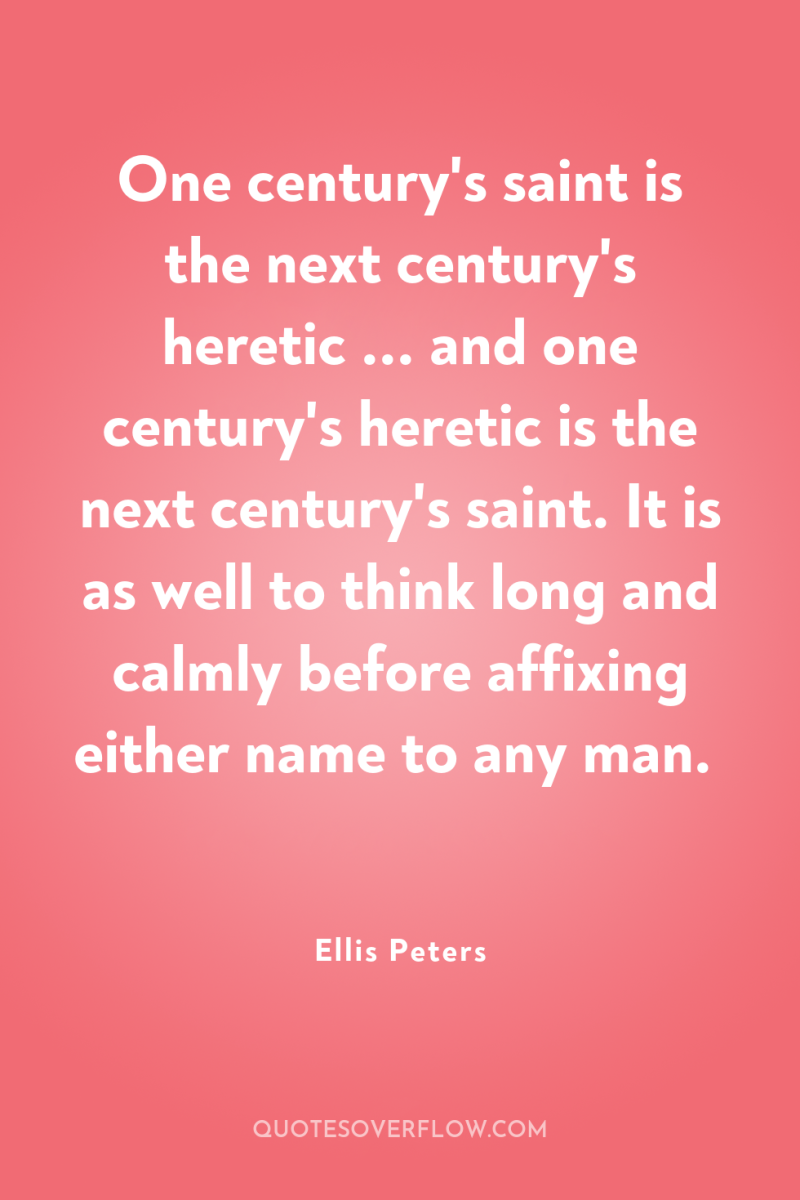
19
One century's saint is the next century's heretic ... and one century's heretic is the next century's saint. It is as well to think long and calmly before affixing either name to any man.Ellis Peters
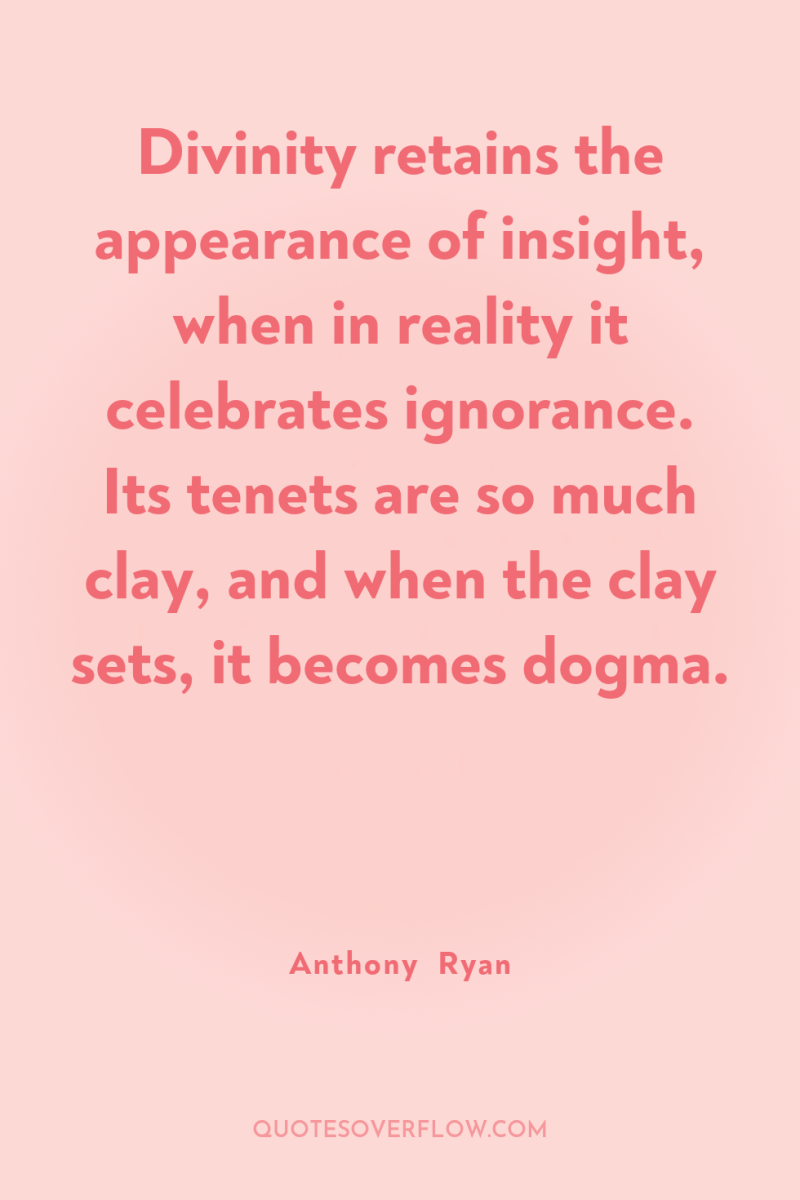
20
Divinity retains the appearance of insight, when in reality it celebrates ignorance. Its tenets are so much clay, and when the clay sets, it becomes dogma.Anthony Ryan
21
Until every soul is freely permitted to investigate every book, and creed, and dogma for itself, the world cannot be free. Mankind will be enslaved until there is mental grandeur enough to allow each man to have his thought and say. This earth will be a paradise when men can, upon all these questions differ, and yet grasp each other's hands as friends. It is amazing to me that a difference of opinion upon subjects that we know nothing with certainty about, should make us hate, persecute, and despise each other. Why a difference of opinion upon predestination, or the trinity, should make people imprison and burn each other seems beyond the comprehension of man; and yet in all countries where Christians have existed, they have destroyed each other to the exact extent of their power. Why should a believer in God hate an atheist? Surely the atheist has not injured God, and surely he is human, capable of joy and pain, and entitled to all the rights of man. Would it not be far better to treat this atheist, at least, as well as he treats us? Christians tell me that they love their enemies, and yet all I ask is–not that they love their enemies, not that they love their friends even, but that they treat those who differ from them, with simple fairness. We do not wish to be forgiven, but we wish Christians to so act that we will not have to forgive them. If all will admit that all have an equal right to think, then the question is forever solved; but as long as organized and powerful churches, pretending to hold the keys of heaven and hell, denounce every person as an outcast and criminal who thinks for himself and denies their authority, the world will be filled with hatred and suffering. To hate man and worship God seems to be the sum of all the creeds. .Robert G. Ingersoll
22
Belief in the traditional sense, or certitude, or dogma, amounts to the grandiose delusion, "My current model" -- or grid, or map, or reality-tunnel -- "contains the whole universe and will never need to be revised." In terms of the history of science and knowledge in general, this appears absurd and arrogant to me, and I am perpetually astonished that so many people still manage to live with such a medieval attitude.Robert Anton Wilson
![Every person should embrace those [dogmas] that he, being the...](https://cdn.quotesoverflow.com/file/quotesoverflow/images/every-person-should-embrace-those-dogmas353478515691-1200.webp)
23
Every person should embrace those [dogmas] that he, being the best judge of himself, feels will do most to strengthen in him love of justice.Baruch Spinoza
24
A true education opens the mind and lets us see the world with wonder and joy. It teaches us to accept change with love, and it teaches us to be harmonious with humanity and nature. If any education teaches us to close our minds, to accept dogma, and to violently inhibit questioning then that is not an education. That is a prison for the mind.Debasish Mridha

25
True education expands your imagination. False education fills your mind with dogma and makes you a prisoner of conformity.Debasish Mridha M.D.
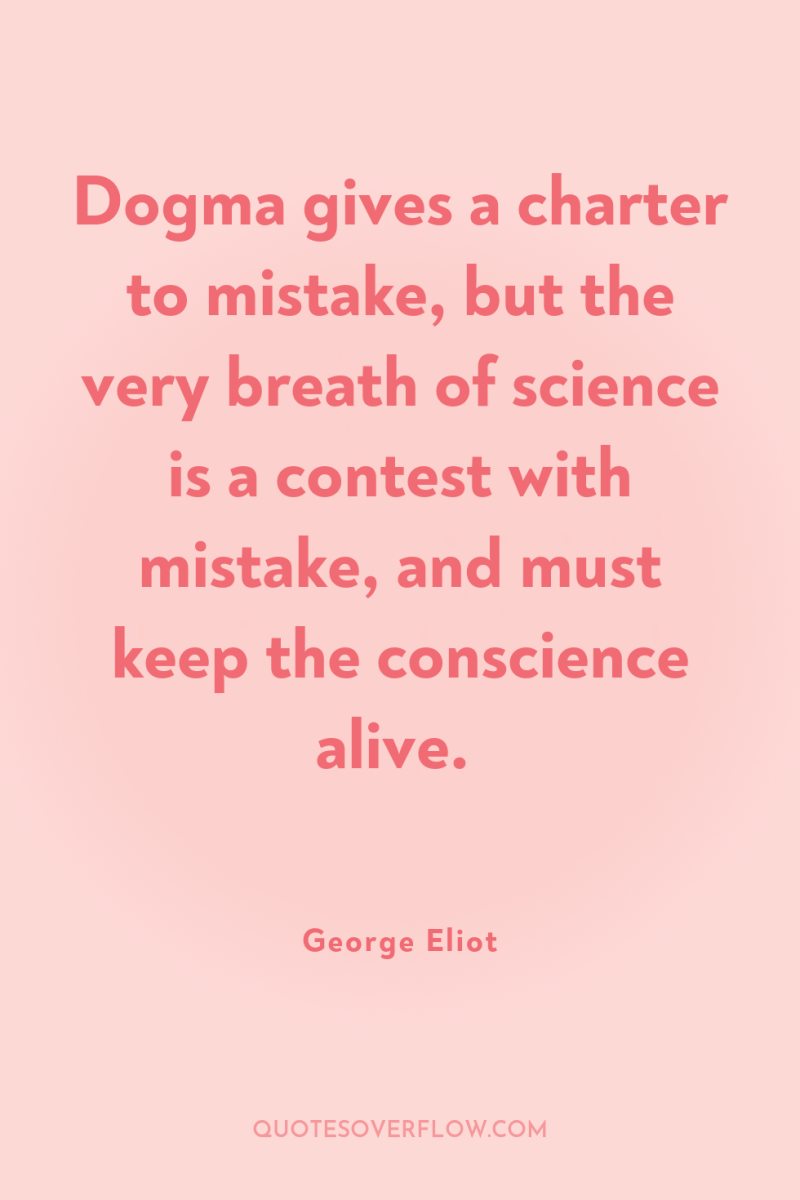
26
Dogma gives a charter to mistake, but the very breath of science is a contest with mistake, and must keep the conscience alive.George Eliot
27
It is better to pray with a pure heart before the family altar than to perform gaudy ceremonies in a pagoda, clad in the robes of an unworthy bonze.Unknown
28
The duality and the freewill don't exist. There's only one choice to be made, the one that bring us upwards. Self-destruction is not a choice. And yet, every duality presents exactly that, and not really a choice.Robin Sacredfire
29
Our desires, dreams and hopes, open portals. These portals manifest in our conscience and five senses, in the form of decisions related to the material world but also opportunities. Now, at the exact same time, or maybe even slightly before in time, we get the exact opposite, the temptation, the illusion and deception. And when we are about to make a decision, as if by magic, the two things come stronger to us, as if pushing us into a duality that makes it hard to decide. Now, this brings me to another super interesting fact: Most people assume that they have freewill, and that choices are hard to be made, and that life is full of dualities. And I've learned that this is just a great deception related to our planet, which, as human beings, we must transcend. And what I'm really saying here is that the duality and the freewill don't exist. There's only one choice to be made, the one that bring us upwards. Self-destruction is not a choice. And yet, every duality presents exactly that, and not really a choice. .Robin Sacredfire
30
The anti-life of [Jerry Falwell] proves only one thing: that you can get away with the most extraordinary offenses to morality and truth in this country if you'll just get yourself called Reverend. People like that should be out in the street, shouting and hollering with a cardboard sign and selling pencils from a cup.Christopher Hitchens
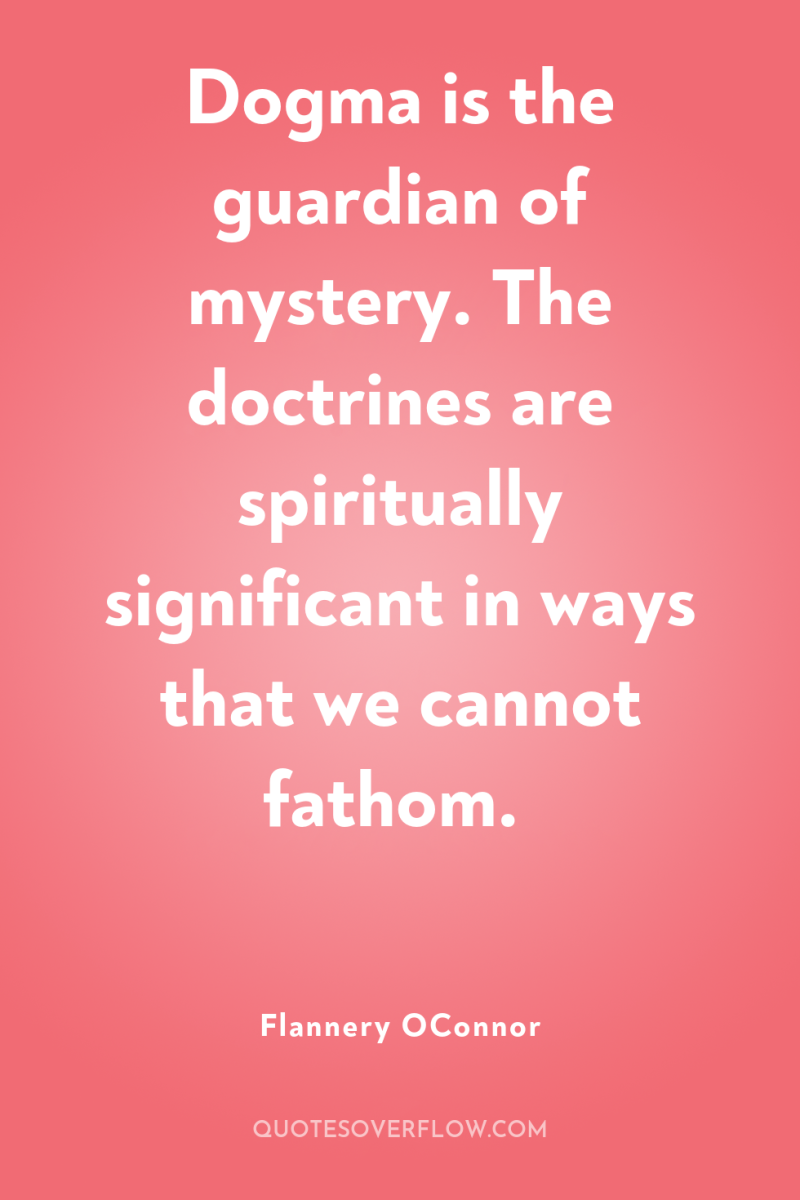
31
Dogma is the guardian of mystery. The doctrines are spiritually significant in ways that we cannot fathom.Flannery OConnor
32
Fusing the doctrines of Plotinus and Proclus with the creeds and beliefs of Christianity, Dionysius the Pseudo-Areopagite combined the Neo-Platonic conviction of the fundamental oneness and luminous aliveness of the world with the Christian dogmas of the triune God, original sin and redemption. The universe is created, animated and unified by the perpetual self-realization of what Plotinus had called "the One, " what the Bible had called "the Lord, " and what he calls "the superessential Light.Erwin Panofsky
33
From the very beginning of the movement in the sixteenth century, Anabaptists shared a deep suspicion of the so-called Schriftgelehrten - the university-trained scholars who, they claimed artfully dodged the clear and simple teachings of Jesus by appealing to complex arguments and carefully crafted statements of doctrine. In other words, they confused theological discussions with lived faith.John D. Roth
34
Belief is the death of intelligence. As soon as one believes a doctrine of any sort, or assumes certitude, one stops thinking about that aspect of existence.Robert Anton Wilson
35
When citizens of a country or nation believe in superstitions or dogma, they will inevitably suffer from tremendous misery or tragedy.Debasish Mridha
36
When we blindly accept an idea, a thought, or a dogma, we become blind.Debasish Mridha
37
Orthodoxy is a relaxation of the mind accompanied by a stiffening of the heart.Edward Abbey
38
That is the idea -- that we should all be wicked if we did not hold to the Christian religion. It seems to me that the people who have held to it have been for the most part extremely wicked. You find this curious fact, that the more intense has been the religion of any period and the more profound has been the dogmatic belief, the greater has been the cruelty and the worse has been the state of affairs. In the so-called ages of faith, when men really did believe the Christian religion in all its completeness, there was the Inquisition, with all its tortures; there were millions of unfortunate women burned as witches; and there was every kind of cruelty practiced upon all sorts of people in the name of religion. You find as you look around the world that every single bit of progress in humane feeling, every improvement in the criminal law, every step toward the diminution of war, every step toward better treatment of the colored races, or every mitigation of slavery, every moral progress that there has been in the world, has been consistently opposed by the organized churches of the world. I say quite deliberately that the Christian religion, as organized in its churches, has been and still is the principal enemy of moral progress in the world. You may think that I am going too far when I say that that is still so. I do not think that I am. Take one fact. You will bear with me if I mention it. It is not a pleasant fact, but the churches compel one to mention facts that are not pleasant. Supposing that in this world that we live in today an inexperienced girl is married to a syphilitic man; in that case the Catholic Church says, 'This is an indissoluble sacrament. You must endure celibacy or stay together. And if you stay together, you must not use birth control to prevent the birth of syphilitic children.' Nobody whose natural sympathies have not been warped by dogma, or whose moral nature was not absolutely dead to all sense of suffering, could maintain that it is right and proper that that state of things should continue. That is only an example. There are a great many ways in which, at the present moment, the church, by its insistence upon what it chooses to call morality, inflicts upon all sorts of people undeserved and unnecessary suffering. And of course, as we know, it is in its major part an opponent still of progress and improvement in all the ways that diminish suffering in the world, because it has chosen to label as morality a certain narrow set of rules of conduct which have nothing to do with human happiness; and when you say that this or that ought to be done because it would make for human happiness, they think that has nothing to do with the matter at all. 'What has human happiness to do with morals? The object of morals is not to make people happy.Bertrand Russell
39
When a child reaches adolescence, there is very apt to be a conflict between parents and child, since the latter considers himself to be by now quite capable of managing his own affairs, while the former are filled with parental solicitude, which is often a disguise for love of power. Parents consider, usually, that the various moral problems which arise in adolescence are peculiarly their province. The opinions they express, however, are so dogmatic that the young seldom confide in them, and usually go their own way in secret.Bertrand Russell
40
With theology as a code of dogmas which are to be believed, or at any rate repeated, under penalty of present or future punishment, or as a storehouse of anaesthetics for those who find the pains of life too hard to bear, I have nothing to do; and, so far as it may be possible, I shall avoid the expression of any opinion as to the objective truth or falsehood of the systems of theological speculation of which I may find occasion to speak. From my present point of view, theology is regarded as a natural product of the operations of the human mind, under the conditions of its existence, just as any other branch of science, or the arts of architecture, or music, or painting are such products. Like them, theology has a history. Like them also, it is to be met with in certain simple and rudimentary forms; and these can be connected by a multitude of gradations, which exist or have existed, among people of various ages and races, with the most highly developed theologies of past and present times. .Thomas Henry Huxley
41
Belief is made up of the same non-substance of which we ourselves are composed. The test of any belief system, then, is the degree to which this same light is permitted to shine through.Eric Michael Leventhal
42
The evidence never seemed to matter to those in power, who had already made up their minds and did what people typically do when their worldview is threatened by new data: they attacked the messenger.Sol Luckman
43
In the search for truth, what you believe matters lessthan how you believe.Eric Michael Leventhal
44
All children are curious and I wonder by what process this trait becomes developed in some and suppressed in others. I suspect again that schools and colleges help in the suppression insofar as they meet curiosity by giving the answers, rather than by some method that leads from narrower questions to broader questions. It is hard to satisfy the curiosity of a child, and even harder to satisfy the curiosity of a scientist, and methods that meet curiosity with satisfaction are thus not apt to foster the development of the child into the scientist. I don't advocate turning all children into professional scientists, although I think there would be advantages if all adults retained something of the questioning attitude, if their curiosity were less easily satisfied by dogma, of whatever variety. .Marston Bates
45
The humanitarian philosophies that have been developed (sometimes under some religious banner and invariably in the face of religious opposition) are human inventions, as the name implies - and our species deserves the credit. I am a devout atheist - nothing else makes any sense to me and I must admit to being bewildered by those, who in the face of what appears so obvious, still believe in a mystical creator. However I can see that the promise of infinite immortality is a more palatable proposition than the absolute certainty of finite mortality which those of us who are subject to free thought (as opposed to free will) have to look forward to and many may not have the strength of character to accept it. Thus I am a supporter of Amnesty International, a humanist and an atheist. I believe in a secular, democratic society in which women and men have total equality, and individuals can pursue their lives as they wish, free of constraints - religious or otherwise. I feel that the difficult ethical and social problems which invariably arise must be solved, as best they can, by discussion and am opposed to the crude simplistic application of dogmatic rules invented in past millennia and ascribed to a plethora of mystical creators - or the latest invention; a single creator masquerading under a plethora of pseudonyms. Organisations which seek political influence by co-ordinated effort disturb me and thus I believe religious and related pressure groups which operate in this way are acting antidemocratically and should play no part in politics. I also have problems with those who preach racist and related ideologies which seem almost indistinguishable from nationalism, patriotism and religious conviction.Harry W. Kroto
46
There is NO way you're living out your purpose if you're conforming to the rules. There is NO way you'll fulfill your destiny if you're trapped in the dogma of what other people think.Catrice M. Jackson
47
We all know dogmatists who are more concerned about holding their opinions than about investigating their truth.... if they are mistaken, they will never discover it; they have condemned themselves to perpetual error. Human beings (including myself) sometimes use their beliefs for wish-fulfillment. Too often we believe what we want to be true.David L. Wolfe
48
Sometimes we believe it is truth, not because it is truth but because it has been made truth by law or tradition. Some of those truths are nothing but dogmatized mythsBangambiki Habyarimana
49
Even the best cookery book is no substitute for even the worst dinner.Aldous Huxley
50
I am what I might term an unprejudiced sceptic. I am not given to either believing or disbelieving things 'on principle, ' as I have found many idiots prone to be, and what is more, some of them not ashamed to boast of the insane fact.William Hope Hodgson
51
We do not need definite beliefs because their objects are necessarily true. We need them because they enable us to stand on steady spots from which the truth may be glimpsed. And not simply glimpsed–because certainly revelation is available outside of dogma; indeed all dogma, if it’s alive at all, is the result of revelation at one time or another–but gathered in. Definite beliefs are what make the radical mystery–those moments when we suddenly know there is a God, about whom we “know” absolutely nothing–accessible to us and our ordinary, unmysterious lives. And more crucially: definite beliefs enable us to withstand the storms of suffering that come into every life, and that tend to destroy any spiritual disposition that does not have deep roots.Christian Wiman
52
Theology is a superstition– Humanity a religion.Robert G. Ingersoll
53
Its all about perspective, that is how you look at things. Your own thoughts and outlook defines whether an experience, event, situation whatever is good or bad. And your definition determines your response.Stella Payton
54
Its all about perception, that is how you look at. Your own thoughts and outlook defines whether it is good or bad. And your definition determines your response.Stella Payton
55
The modern world is filled with men who hold dogmas so strongly that they do not even know that they are dogmas. It may be said even that the modern world, as a corporate body, holds certain dogmas so strongly that it does not know that they are dogmas. It may be thought 'dogmatic, ' for instance, in some circles accounted progressive, to assume the perfection or improvement of man in another world. But it is not thought "dogmatic" to assume the perfection or improvement of man in this world; though that idea of progress is quite as unproved as the idea of immortality, and from a rationalistic point of view quite as improbable. Progress happens to be one of our dogmas, and a dogma means a thing which is not thought dogmatic.G.k. Chesterton
56
Never hold a belief longer than you can hold your breath.Marty Rubin
57
Never trust the translation or interpretation of something without first trusting its interpreter. One word absent from a sentence can drastically change the true intended meaning of the entire sentence. For instance, if the word love is intentionally or accidentally replaced with hate in a sentence, its effect could trigger a war or false dogma.Suzy Kassem
58
This doctrine of forgiveness of sin is a premium on crime. 'Forgive us our sins' means "Let us continue in our iniquity." It is one of the most pernicious of doctrines, and one of the most fruitful sources of immorality. It has been the chief cause of making Christian nations the most immoral of nations. In teaching this doctrine Christ committed a sin for which his death did not atone, and which can never be forgiven. There is no forgiveness of sin. Every cause has its effect; every sinner must suffer the consequences of his sins.John E. Remsburg
59
Mother Nature gave Jesus, the Son of Nature the biological elements to see things that nobody else could, or rather nobody else would. And you are the child of Nature as well. As such you have all the powers within you, just like Jesus, to rise above the laws of the society that tend to bind your conscience with textual mysticism and fanaticism.Abhijit Naskar
60
The imagination is truly the enemy of bigotry and dogma.Unknown
61
An Ego Mind is a destructive mind and a rational mind is a peaceful mind.Charleston Parker
62
Loving, of enemies is another dogma of feigned morality, and has besides no meaning. It is incumbent on man, as a moralist, that he does not revenge an injury; and it is equally as good in a political sense, for there is no end to retaliation; each retaliates on the other, and calls it justice: but to love in proportion to the injury, if it could be done, would be to offer a premium for a crime. Besides, the word enemies is too vague and general to be used in a moral maxim, which ought always to be clear and defined, like a proverb. If a man be the enemy of another from mistake and prejudice, as in the case of religious opinions, and sometimes in politics, that man is different to an enemy at heart with a criminal intention; and it is incumbent upon us, and it contributes also to our own tranquillity, that we put the best construction upon a thing that it will bear. But even this erroneous motive in him makes no motive for love on the other part; and to say that we can love voluntarily, and without a motive, is morally and physically impossible. Morality is injured by prescribing to it duties that, in the first place, are impossible to be performed, and if they could be would be productive of evil; or, as before said, be premiums for crime. The maxim of doing as we would be done unto does not include this strange doctrine of loving enemies; for no man expects to be loved himself for his crime or for his enmity. Those who preach this doctrine of loving their enemies, are in general the greatest persecutors, and they act consistently by so doing; for the doctrine is hypocritical, and it is natural that hypocrisy should act the reverse of what it preaches. For my own part, I disown the doctrine, and consider it as a feigned or fabulous morality; yet the man does not exist that can say I have persecuted him, or any man, or any set of men, either in the American Revolution, or in the French Revolution; or that I have, in any case, returned evil for evil.Thomas Paine
63
If you do not want to stop the wheels of progress; if you do not want to go back to the Dark Ages; if you do not want to live again under tyranny, then you must guard your liberty, and you must not let the church get control of your government. If you do, you will lose the greatest legacy ever bequeathed to the human race–intellectual freedom. Now let me tell you another thing. If all the energy and wealth wasted upon religion–in all of its varied forms–had been spent to understand life and its problems, we would today be living under conditions that would seem almost like Utopia. Most of our social and domestic problems would have been solved, and equally as important, our understanding and relations with the other peoples of the world would have, by now, brought about universal peace. Man would have a better understanding of his motives and actions, and would have learned to curb his primitive instincts for revenge and retaliation. He would, by now, know that wars of hate, aggression, and aggrandizement are only productive of more hate and more human suffering. The enlightened and completely emancipated man from the fears of a God and the dogma of hate and revenge would make him a brother to his fellow man. He would devote his energies to discoveries and inventions, which theology previously condemned as a defiance of God, but which have proved so beneficial to him. He would no longer be a slave to a God and live in cringing fear!.Joseph Lewis
64
Mystical experience needs some form of dogma in order not to dissipate into moments of spiritual intensity that are merely personal, and dogma needs regular infusions of unknowingness to keep from calcifying into the predictable, pontificating, and anti-intellectual services so common in mainstream American churches. So what does all this mean practically? It means that congregations must be conscious of the persistent and ineradicable loneliness that makes a person seek communion, with other people and with God, in the first place. It means that conservative churches that are infused with the bouncy brand of American optimism one finds in sales pitches are selling shit. It means that liberal churches that go months without mentioning the name of Jesus, much less the dying Christ, have no more spiritual purpose or significance than a local union hall. It means that we -- those of us who call ourselves Christians -- need a revolution in the way we worship. This could mean many different things -- poetry as liturgy, focused and extended silences, learning from other religious traditions and rituals (this seems crucial), incorporating apophatic language. But one thing it means for sure: we must be conscious of language as language, must call into question every word we use until we refine or remake a language that is fit for our particular religious doubts and despairs -- and of course (and most of all! ) our joys. .Christian Wiman
65
The spectacle of what is called religion, or at any rate organised religion, in India and elsewhere, has filled me with horror and I have frequently condemned it and wished to make a clean sweep of it. Almost always it seemed to stand for blind belief and reaction, dogma and bigotry, superstition, exploitation and the preservation of vested interests.Jawaharlal Nehru
66
Every sentence I utter must be understood not as an affirmation but as a question.[ A caution he gives his students, to be wary of dogmatism.]Niels Bohr
67
Fear mankind most when he fights with a consuming passion for what he perceives to be true." ~ Demo Cratia.Farah Evers
68
Nobody wants to know how you feel, yet, they want you to do what they feel.Michael Bassey Johnson
69
Intelligent men do not decide any subject until they have carefully examined both or all sides of it. Fools, cowards, and those too lazy to think, accept blindly, without examination, dogmas and doctrines imposed upon them in childhood by their parents, priests, and teachers, when their minds were immature and they could not reason.James Hervey Johnson
70
The theologians dead, knew no more than the theologians now living. More than this cannot be said. About this world little is known, –about another world, nothing. Our fathers were intellectual serfs, and their fathers were slaves. The makers of our creeds were ignorant and brutal. Every dogma that we have, has upon it the mark of whip, the rust of chain, and the ashes ofRobert G. Ingersoll
71
There have always been ignorant people, but they haven't always had college degrees to make them unaware of their ignorance. Some people imagine that they are well informed because they have memorized a whole galaxy of trendy dogmas and fashionable attitudes.Thomas Sowell
72
Fanatics are like debris following the course of the wind, they are swept around like sand, and convinced to believe in what they do not understand.Michael Bassey Johnson
73
People often mistake their imagination for their heart, & so often are convinced they are converted as soon as they start thinking of becoming converted.Blaise Pascal
74
God seemed to have become a brand, a packaging, and people purchase this trusted brand with such faith and devotion that they no longer care who the vendor is.Justin Villanueva
75
Evidence is of no longer consequence when hope enters the fray, and this is where faith is born–a seemingly abundant commodity certain powerful organizations feed on fervently, if not lavishly.Justin Villanueva
76
Evidence is of no longer consequence when hope enters the fray, and this iswhere faith is born–a seemingly abundant commodity certain powerfulorganizations feed on fervently, if not lavishly.Justin Villanueva
77
Therefore, when a person refuses to come to Christ it is never just because of a lack of evidence or because of intellectual difficulties: at root, he refuses to come because he willingly ignores and rejects the drawing of God's Spirit on his heart. No one in the final analysis fails to become a Christian because of a lack of arguments; he fails to become a Christian because he loves darkness rather than light and wants nothing to do with god.William Lane Craig
78
Some people spend their entire lives devoted to a religion that claims to be the ‘right’ religion.. they often deny scientific evidence that contradicts their archaic holy books, they sometimes oppress those who disagree with them, and they always do what they do in the name of an unknowable deity.. but sometimes, they wake up. Occasionally, they realize that all religions are man-made and that none of them are ‘right.’ And when they do, they can live happy and fulfilling lives without dogma and without anticipating or fearing an afterlife. .David G. McAfee
79
Science has never killed or persecuted a single person for doubting or denying its teaching, and most of these teaching have been true; but religion has murdered millions for doubting or denying her dogmas and most of these dogmas have been false. All stories about gods and devils, of heavens and hells, as they do not conform to nature, and are not apparent to sense, should be rejected without consideration. Beyond the universe there is nothing and within the universe the supernatural does not and cannot exist. Of all deceivers who have plagued mankind, none are so deeply ruinous to human happiness as those imposters who pretend to lead by a light above nature. The lips of the dead are closed forever. There comes no voice from the tomb. Christianity is responsible for having cast the fable of eternal fire over almost every grave. .Gratis P. Spencer
80
Without the voice of reason, every faith is its own cSting
81
Human reason reduced to its own resources is perfectly worthless, not only for creating but also for preserving any political or religious association, because it only produces disputes, and, to conduct himself well, man needs not problems but beliefs. His cradle should be surrounded by dogmas, and when his reason is awakened, it should find all his opinions ready-made, at least all those relating to his conduct. Nothing is so important to him as prejudices, Let us not take this word in a bad sense. It does not necessarily mean false ideas, but only, in the strict sense of the word, opinions adopted before any examination. Now these sorts of opinions are man’s greatest need, the true elements of his happiness, and the Palladium of empires. Without them, there can be neither worship, nor morality, nor government. There must be a state religion just as there is a state policy; or, rather, religious and political dogmas must be merged and mingled together to form a complete common or national reason strong enough to repress the aberrations of individual reason, which of its nature is the mortal enemy of any association whatever because it produces only divergent opinions. All known nations have been happy and powerful to the extent that they have more faithfully obeyed this national reason, which is nothing other than the annihilation of individual dogmas and the absolute and general reign of national dogmas, that is to say, of useful prejudices. Let each man call upon his individual reason in the matter of religion, and immediately you will see the birth of an anarchy of belief or the annihilation of religious sovereignty. Likewise, if each man makes himself judge of the principles of government, you will at once see the birth of civil anarchy or the annihilation of political sovereignty. Government is a true religion: it has its dogmas, its mysteries, and its ministers. To annihilate it or submit it to the discussion of each individual is the same thing; it lives only through national reason, that is to say through political faith, which is a creed. Man’s first need is that his nascent reason be curbed under this double yoke, that it be abased and lose itself in the national reason, so that it changes its individual existence into another common existence, just as a river that flows into the ocean always continues to exist in the mass of water, but without a name and without a distinct reality. .Joseph De Maistre
82
Theology is not a private subject for theologians only. Nor is it a private subject for professors. Fortunately, there have always been pastors who have understood more about theology than most professors. Nor is theology a private subject of study for pastors. Fortunately, there have repeatedly been congregation members, and often whole congregations, who have pursued theology energetically while their pastors were theological infants or barbarians. Theology is a matter for the Church.Karl Barth
83
Karate is not A religion, cult or dogma. It is incumbent on every generation of martial artists, to find the weaknesses of the previous generations, not to revere it .. .Soke Behzad Ahmadi
84
Power operates only destructively, bent always on forcing every manifestation of life into the straitjacket of its laws. Its intellectual form of expression is dead dogma, its physical form brute force.Rudolf Rocker
85
Then, what is sacrelige [sic]? If it is nothing more than a rebellion against dogma, it is eventually as meaningless as the dogma it defies, and they are both become hounds ranting in the high grass, never see the boar in the thicket. Only a religious person can perpetrate sacrelige: and if its blasphemy reaches the heart of the question; if it investigates deeply enough to unfold, not the pattern, but the materials of the pattern, and the necessity of a pattern; if it questions so deeply that the doubt it arouses is frightening and cannot be dismissed; then it has done its true sacreligious [sic] work, in the service of its adversary: the only service that nihilism can ever perform.(unused 1949 prefatory note to The Recognitions) .William Gaddis
86
Sexual distortions carry strong undertones of prejudice–sexism, racism and homophobia–that rob individuals of their individuality. Common stereotypes include “men are all dogs, ” “women are less interested in sex, ” “gays are promiscuous, ” certain races are frigid or hung, and certain sex acts are indulgent, effeminate, or immoral. Other distortions clearly function as tools of organizations or of religious or political figures to shape public opinion through dogma and to control their followers’ lives.Alexandra Katehakis
87
The bare knowledge of God's will is inefficacious, it doth not better the heart. Knowledge alone is like a winter sun, which hath no heat or influence; it doth not warm the affections, or purify the conscience. Judas was a great luminary, he knew God's will, but he was a traitor.Thomas Watson
88
The somatotype of the cat or any animal from quadruped to biped partially determines the perspective of the creature. The physiology of any given creature will alter its understanding of its environment. A close look then at the physiology of cats and dogs and one biped, in particular, the primate, should give anyone a clear reason for the biological and psychological shaping of religion. This examination of cats, dogs and then other primates, humanity's cousins, in comparison with some religious ideals, will show just how physiological perspectives would and have influenced religious dogma or cat-ma as the case may be. .Leviak B. Kelly
89
For Abelard, the death of Christ on the Cross did not, strictly speaking, redeem man: it only offered him an example of supreme humility, charity, and self-sacrifice. Bernard asserts, against Abelard, that Christ became man precisely in order to redeem mankind from sin, deliver man from the power of the devil, and to become, instead of fallen Adam, the new head of a redeemed and sanctified human race. Jesus, says Saint Bernard, not only taught us justice but gave us justice. He not only showed us His love by dying for us on the Cross, but by the effects of His death He really and objectively causes His charity to exist and act in our hearts. In, doing so, He actually destroys sin in our souls and communicates to us a new life which is totally supernatural and divine. The effect of our redemption is therefore a complete and literal regeneration of those souls to whom its fruits are applied. Without this dogmatic basis the whole mystical theology of Saint Bernard would be incomprehensible. The purpose of all his mystical and ascetic teaching is to show us how to co-operate with the action of divine grace so that our redemption and regeneration may not remain a dead letter but may actually influence all our conduct and find expression in every part of our lives .Thomas Merton
90
EQUAL RIGHTS and FREE DISCUSSION will be fearlessly advocated and maintained. Sectarian dogmas or tenets will be investigated and compared.Abner Cole
91
While you were busy trying to prove God stands behind you, God was before me lighting the trail, so he could lead us both.Shannon L. Alder
92
Curiosity and irreverence go together. Curiosity cannot exist without the other. Curiosity asks, "Is this true?" "Just because this has always been the way, is the best or right way of life, the best or right religion, political or economic value, morality?" To the questioner, nothing is sacred. He detests dogma, defies any finite definition of morality, rebels against any repression of a free, open search of ideas no matter where they may lead. He is challenging, insulting, agitating, discrediting. He stirs unrest.Saul D. Alinsky
93
You could harbor a man in your bed or your body, play on his nervous system like Paderewski at the keyboard, and not shift his brain one inch out of the concrete of dogma. (p. 5)Jonathan Lethem
94
We are slaves whose masters are dead. For we are mostly controlled by doctrines which were established centuries heretofore.Mokokoma Mokhonoana
95
I have always found the hardest mind to change is one that is religious.Shannon L. Alder
96
It is certain that the labors of these early workers in the field of natural knowledge were brought to a standstill by the decay and disruption of the Roman Empire, the consequent disorganisation of society, and the diversion of men's thoughts from sublunary matters to the problems of the supernatural world suggested by Christian dogma in the Middle Ages. And, notwithstanding sporadic attempts to recall men to the investigation of nature, here and there, it was not until the fifteenth and sixteenth centuries that physical science made a new start, founding itself, at first, altogether upon that which had been done by the Greeks. Indeed, it must be admitted that the men of the Renaissance, though standing on the shoulders of the old philosophers, were a long time before they saw as much as their forerunners had done.Thomas Henry Huxley
97
Perhaps he even needs to have been a critic and a sceptic and a dogmatist and an historian, and in addition a poet and collector and traveller and puzzle-solver and moralist and seer and ‘free spirit’ and nearly all things, so that he can traverse the range of human values and value-feelings and be able to look with many kinds of eyes and consciences from the heights into every distance, from the depths into every height, from the corners into every wide expanse.Friedrich Nietzsche
98
The dogma of the impossibility of determining the atomic constitution of substances, which until recently was advocated with such fervor by the most able chemists, is beginning to be abandoned and forgotten; and one can predict that the day is not far in the future when a sufficient collection of facts will permit determination of the internal architecture of molecules. A series of experiments directed toward such a goal is the object of this paper.Unknown
99
As to Science, she has never sought to ally herself to civil power. She has never attempted to throw odium or inflict social ruin on any human being. She has never subjected anyone to mental torment, physical torture, least of all to death, for the purpose of upholding or promoting her ideas. She presents herself unstained by cruelties and crimes. But in the Vatican–we have only to recall the Inquisition–the hands that are now raised in appeals to the 'Most Merciful' are crimsoned. They have been steeped in blood! .John William Draper
100
For the modern world will accept no dogmas upon any authority; but it will accept any dogmas on no authority. Say that a thing is so, according to the Pope or the Bible, and it will be dismissed as a superstition without examination. But preface your remark merely with "they say" or "don't you know that?" or try (and fail) to rememver the name of some professor mentioned in some newspaper; and the keen rationalism of the modern mind will accept every word you say.G.k. Chesterton